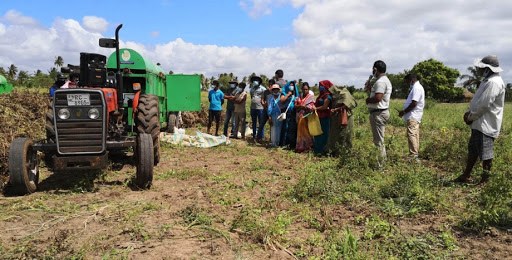Stakeholders in agricultural mechanisation have called for adoption of a value chain approach to mechanisation as one of the best options towards attaining high productivity in agriculture on the continent.

Speaking during a webinar organised by the African Agricultural Technology Foundation (AATF) on Monday, September 28, 2020, the stakeholders agreed that smallholder farmers are key players in the value-chain system that can engender growth and sustainability of Africa’s agricultural productivity.
The stakeholders included experts in agricultural mechanisation, agribusiness, digital agriculture and representatives of global agencies like the World Bank, African Union, the National Agriculture Research Organisation (NARO) of Uganda and private sector players.
Setting the stage, Mr. George Marechera, Business Development Manager at AATF, said mechanisation provides an opportunity for smallholder farmers to evolve from subsistence to business. He, however, added that this can only happen where mechanisation is adopted along the agricultural value chain.
According to Marechera, mechanisation brings about increased production and reduces high labor costs, enhances efficient production at low cost and facilitates competitive pricing, promote efficient use of input and enhance productivity.
“Farmer aggregation, clustering and training on mechanisation and farming as a business, identification of local entrepreneurs and training of tractor operators in mechanisation service provision including the establishment of Mechanisation Model Farms (MMF) to provide technology demonstration and capacity building are critical steps that are needed to ensure mechanisation makes an impact on the continent,” Marechera said.
Marechera, who also serves as the Managing Director of the Agridrive Limited, a socio enterprises owned by AATF and specialising in mechanisation services provision, equipment support and providing agribusiness solutions to farmers in SSA, noted that mechanisation is not a silver bullet to the production challenges facing agriculture but encouraged the introduction of a mechanisation system that ensures smallholder farmers get optimal benefits from utilising mechanisation.
Dr Parmesh Shah, Global Lead, Data-driven and Digital Agriculture at the World Bank, in his presentation on opportunities and challenges for sustainable financing of agricultural mechanisation in Africa, noted that mechanisation goes beyond deployment of tractors to farms as it involves production, harvesting, post-harvest handling, transportation, storage, and packaging.
Speaking on the spatial variations of mechanisation demand across Africa, Shah noted that most African countries are not at par when it comes to the deployment of tractors in agriculture. He therefore called for a critical review of sub-regional patterns in the utilisation of mechanisation to see what works and what can be borrowed.
Dr. Omongo Christopher Abu, Principal Research Officer with the National Agricultural Organisation (NARO)-Uganda, who traced the origin of agricultural mechanisation in Africa to the early 1950s and acknowledged the low level of mechanisation in the agricultural value chain, added that over 90 percent of transactions (farm production-to -market) are handled through inefficient labour intensive tools.
According to Dr Abu, agricultural mechanisation is a catalyst for economic growth and therefore needs to be promoted as a business on the continent.
Kalongo Chitengi, a Senior Manager with AGCO Future Farm, called for a deliberate government policy that favours tax rates and duties to promote mechanization, adding that such government-backed agricultural policies have the potential of making farming profitable.
Brett Hudson from KURAI, who spoke on enhancing access to agricultural mechanisation through digital tools, noted that it was important to bridge the knowledge gap in mechanisation by making available crucial information that will help prospective farmers.
Such information, according to him, should include what machinery are needed, as well as where and how they can be found. “This is vital as agricultural machines which are the drivers of mechanization are often unaffordable for smallholder farmers,” he added.
